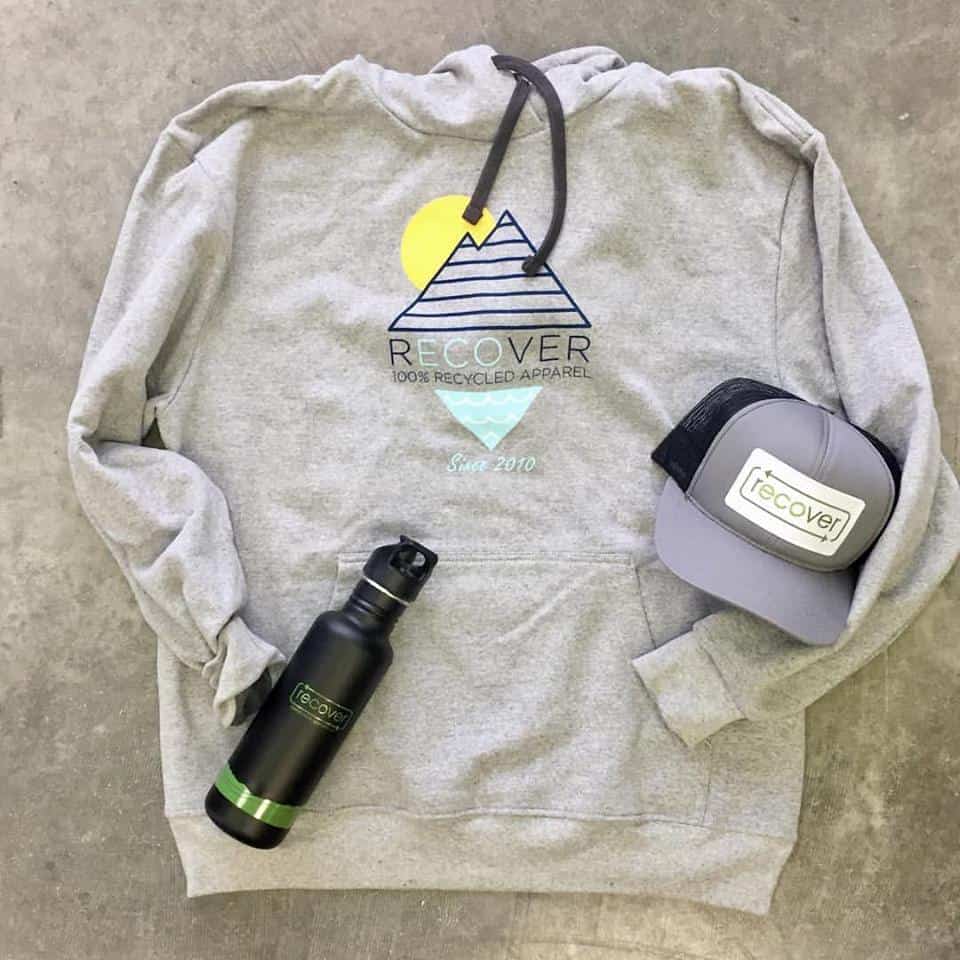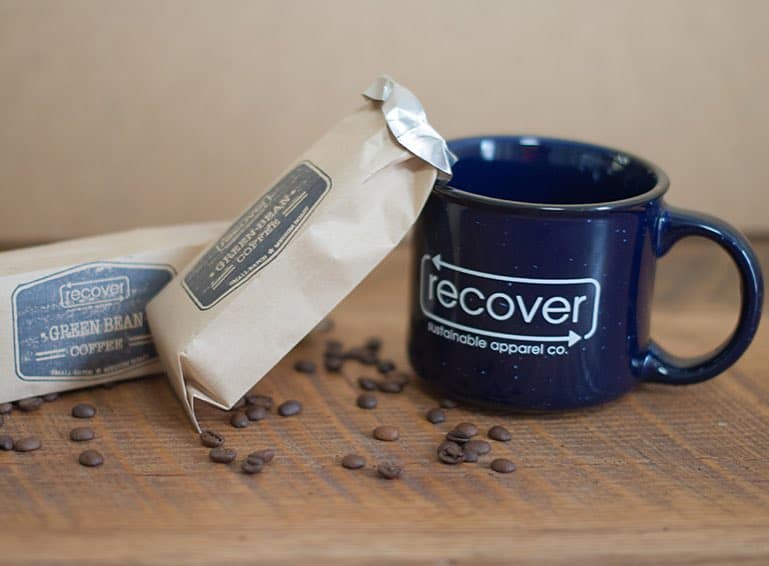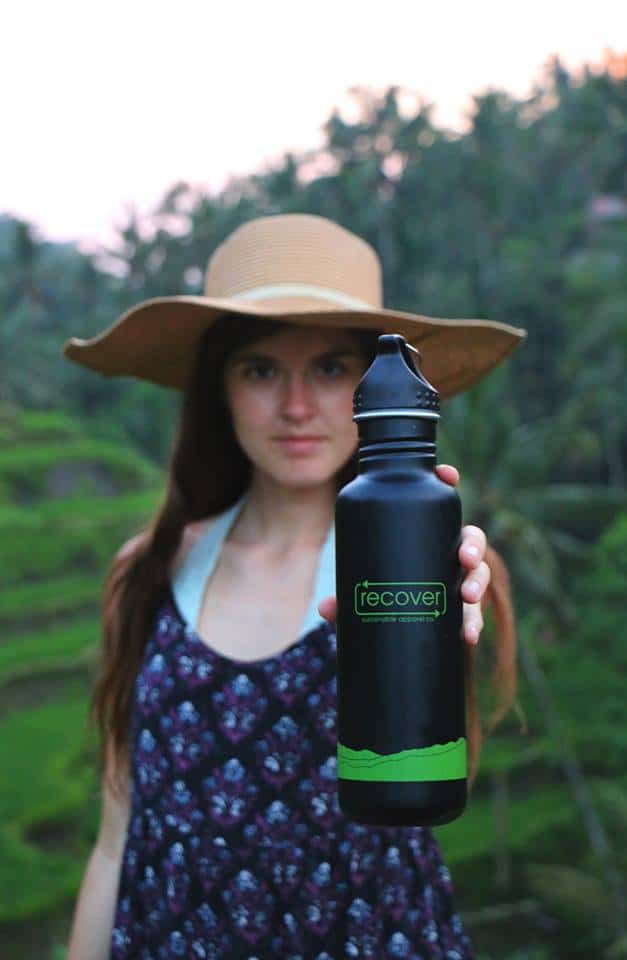Meet the American manufacturing company Recover Brands. Recover strives to create the best, most environmentally friendly and socially responsible products possible.
Founded by Bill Johnston and John Riddle, Recover produces sustainable apparel, and also developed a 360° process — from design to manufacturing to fulfillment — as environmentally conscious as the products they sell.
Recover minimizes dyes, significantly reduces the use of chemicals, water and energy; and completely eliminates plastic packaging.
See below for a Q & A with the co-founder of Recover Brands, Bill Johnston
The story of Recover Brands starts off with an adventure. Tell us the details: how did a bike trip suddenly turn into a business?
As you spend miles and miles on a bike, the world begins to spin in a different way. It forces you to slow down and take a more present look at what’s around you. But to take a step back, or rather forward, John Riddle and I founded Recover Brands in early 2010.
We are both from North Carolina, but at the time, I was working for an outdoor adventure company, guiding backpacking and mountaineering trips that were 3 to 4 week programs. It was an unbelievable job that took me all over the world.
I was really passionate about the environmental education piece of my outdoor adventure work, exposing teenagers to the outdoors, Leave No Trace practices and ethics, and simply enjoying getting out in nature.
I connected with John Riddle (a good friend of my family) with the simple intention of buying a road bike. John and my dad are both in the textile industry and John has been selling yarn to my dad for over 25 years.
I have always been a big mountain biker, and was interested in getting into road biking, so my dad connected me with John because John had a fleet of bikes and actually used to race.
I met up with him in good ol’ Hickory, North Carolina to buy a bike. As it turned out, I got a bike, a riding partner, and a business partner out of the deal.John and I started going on rides together.
One of the many gifts of biking is the time it gives to have genuine conversations.
John could tell how passionate I was about sustainable business. I had always wanted to get into sustainable business and was borderline obsessed, but when I graduated in the 2009 recession, it wasn’t a great job market, so I started thinking outside of the box a bit.
I liked the idea of starting my own thing, but didn’t know what to do. John has a lifetime of knowledge in the textile industry and introduced me to the technology behind recycled textiles.
I was really fascinated by the technology and the potential with it, and started beating on John’s door saying, “We need to use this and go into business together.” John is an entrepreneurial guy and was willing to take a risk on it. It all came together from there.

When utilizing recycled bottles to create apparel, the biggest question from consumers is usually “is it soft?”. What exactly does the process look like, that results in a fresh, soft, recycled shirt?
That’s a great question. We hear that from people so often, as it’s automatically assumed that anything made up of recycled material is going to be scratchy, itchy, and uncomfortable, but it’s the exact opposite in the case of Recover apparel.
It took a couple of years at the start of the business and we’ve worked hard to create everything to be soft, extremely comfortable, and made of recycled, or rather upcycled material that we were ready to take to the market.
While traditionally recycled material was used for more industrial goods, such as carpet, Recover pushed the envelope to create recycled material that is soft and comfortable.
We worked with our suppliers for lighter weight yarns and fabric that are softer, lighter, more breathable, and very comfortable.
Eight plastic bottles make one Recover shirt. All bottles are post-consumer waste, the #1s and #2s that you put in your recycling bin.
Post-consumer plastic recycling is brought in from all over world to various plants and it just happens to be processed at a plant in North Carolina. One of our suppliers works with the recycling plant.
The facility (which is in our backyard) washes the bottles, shaves them down into really thin flakes, and melts those flakes into small pellets that Recover uses to make shirts.
The cotton we use is industrial scrap from other manufacturers. We use the old clippings from cut and sew operations.
The cotton waste is sorted by colors. As it is all pre-colored, Recover’s process is extremely eco-friendly because the elimination of using dyes saves a ton of water and energy throughout the entire American manufacturing process.
Our soft, comfortable Recover apparel is simply made of a blend of this recycled plastic and upcycled cotton.
Many people say American manufacturing is dead and can’t be profitable, but some items Recover produces are made in America.
How have you been successful at building an American clothing manufacture?
For American-made products, there are definitely some benefits to American manufacturing. It cuts down on transit time, and in being geographically closer to the actual manufacturing, Recover can keep a closer eye on things and produce the products we have envisioned and designed more efficiently.
The cut and sew is more expensive in the U.S., but in creating specialty products, we get to control the entirety of our manufacturing all the way to the consumer, which makes it easier to ensure the high quality of Recover apparel and accessories.
In terms of the higher costs of cut and sew in the U.S., Recover builds nicer products, so we can charge a little more because you get more.
It’s tough to be economically competitive if you start comparing to more commodity products of cheaper fast fashion, but with those products there’s absolutely no comparison between quality and what goes into those products vs.
Recover’s in terms of being mindful of sustainability and environmental and human health. For Recover, it’s no question that it’s worth the extra short-term monetary costs to take long term effects of manufacturing into account with every decision we make.
We want to make a positive lasting difference in our global community, not a negative one.
What are some of the difficulties about American manufacturing? What has been your inspiration of building Recover in America and not outsourcing everything to abroad?
My inspiration is rooted in growing up around textiles. I live in a textile rich area and that is really near and dear to me personally.
I care about it a lot and we love being part of re-establishing some of that rich textile history here in North Carolina. In terms of the challenges of keeping manufacturing in America, the biggest one is the labor.
It’s really hard to find people in the U.S. who want those cut and sew jobs. Since manufacturing jobs moved overseas in the 1990s, there hasn’t been a trained work force to cut and sew for over 20 years and it doesn’t seem Americans want those jobs now.
How did your team go about finding sustainable co-ops in Guatemala and Haiti?
I attribute those initial connections to my business partner John Riddle. His experience in the textile world and his 30 years of industry experience initiated those relationships and ensured the incredible credibility of the co-ops.
Growing up around textiles, I have a serious interest in manufacturing and what’s involved. Focus on where everything is sourced and nurturing positive community relationships is how Recover was established.
Fortunately, in Guatemala, Haiti, and beyond good relationships have continued to grow as we give these work co-ops more and more business and continue to take a holistic approach to how Recover products are made.

What was your experience like when you first visited one of the co-ops?
At the start, I was set on the idea of let’s do as much local as possible and try to make these products in North Carolina and the U.S. When I learned about the connections that John had in Haiti and Guatemala, I was really excited to explore those as a possibility.
Going down there, it was amazing how important the co-ops are to the economy, how nice the people are and how incredible the working conditions are- Central American sewing facilities are generally nicer than the ones in the U.S.
The sewing facilities give great opportunity within the communities; they give people jobs that the locals really want, coveted jobs that help to stimulate economy. The quality of products and skills of the workers is really high. Recover will definitely continue to pursue and maintain co-op partnerships.
How has your process changed over the last seven years, since launching in 2010?
From a process standpoint, the fabric that we’re making and the garments in general are much softer. As I mentioned, we have put emphasis on lighter weight, softer, and more comfortable to wear, and with that, each production round of product improves in softness and overall comfort.
As a company, we continue to evolve every day, and explore and grow in different markets where we can be most successful.

All Recover Brands apparel is extremely well priced, how are you able to keep your items so affordable while running an extremely environmentally and economically sustainable business?
One of the keys for us is being as vertical as possible. There’s no doubt our raw materials cost more with the nature of buying recycled products and upcycled materials and converting them into product, but we are able to save in certain areas by controlling the whole process.
We try to have very reasonable prices and our products have very fairly priced margins. With that, we are able to do more volume and make more money.
Where do you picture Recover Brands standing at the ten year mark in 2020?
Great question, the idea of Recover going on ten years in 2020 is crazy to be honest. But, today when I look at the next three years, our co-branded wholesale will really, really continue to grow.
We see this on a daily basis and there is growth and requests for us in this market, which is a great sign. It is the core of our business. We’re also putting a lot of time and energy into direct consumer through ecommerce on our website.
We’re building out our retail piece, and will continue to round out more of a full line in the next 3 years and beyond.
Our direct to consumer online still has a long way to go and is key for our growth.
Latest Stories
- What are Plant Based Fibers
- 7 Sustainable and Eco Friendly Floss Options
- Anshul Magotra: How Social Innovation Circle Supports Impact Entrepreneurs
- Causeartist Brief – U.S. Department of Energy x Google, Bezos Centers for Sustainable Protein, Oregon Biochar Solutions
- Evidencity: Pioneering the Fight Against Modern Slavery Through Tech








